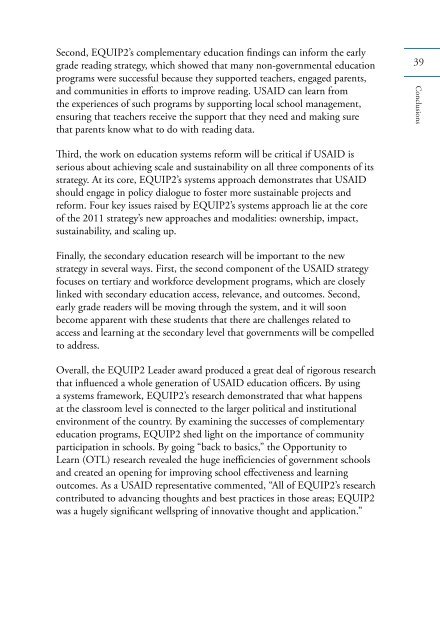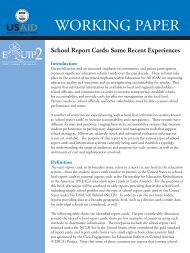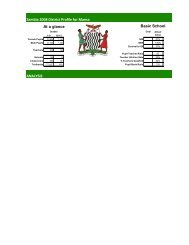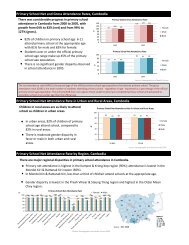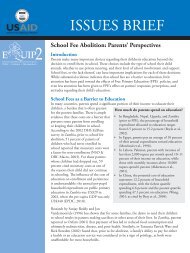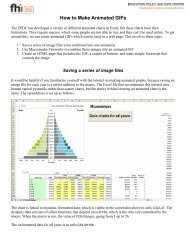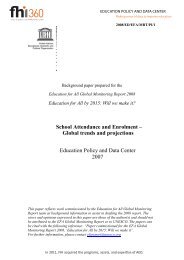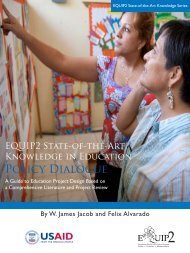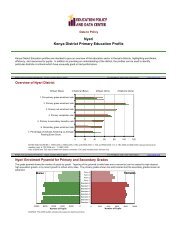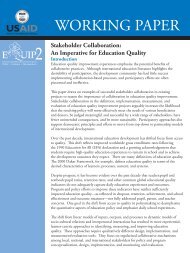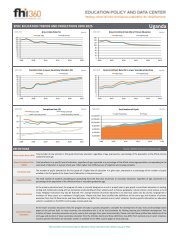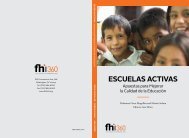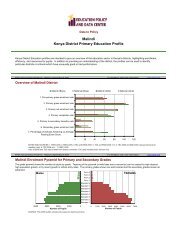EQUIP2 Final Report.pdf - Education Policy Data Center
EQUIP2 Final Report.pdf - Education Policy Data Center
EQUIP2 Final Report.pdf - Education Policy Data Center
You also want an ePaper? Increase the reach of your titles
YUMPU automatically turns print PDFs into web optimized ePapers that Google loves.
Second, <strong>EQUIP2</strong>’s complementary education findings can inform the early<br />
grade reading strategy, which showed that many non-governmental education<br />
programs were successful because they supported teachers, engaged parents,<br />
and communities in efforts to improve reading. USAID can learn from<br />
the experiences of such programs by supporting local school management,<br />
ensuring that teachers receive the support that they need and making sure<br />
that parents know what to do with reading data.<br />
39<br />
Conclusions<br />
Third, the work on education systems reform will be critical if USAID is<br />
serious about achieving scale and sustainability on all three components of its<br />
strategy. At its core, <strong>EQUIP2</strong>’s systems approach demonstrates that USAID<br />
should engage in policy dialogue to foster more sustainable projects and<br />
reform. Four key issues raised by <strong>EQUIP2</strong>’s systems approach lie at the core<br />
of the 2011 strategy’s new approaches and modalities: ownership, impact,<br />
sustainability, and scaling up.<br />
<strong>Final</strong>ly, the secondary education research will be important to the new<br />
strategy in several ways. First, the second component of the USAID strategy<br />
focuses on tertiary and workforce development programs, which are closely<br />
linked with secondary education access, relevance, and outcomes. Second,<br />
early grade readers will be moving through the system, and it will soon<br />
become apparent with these students that there are challenges related to<br />
access and learning at the secondary level that governments will be compelled<br />
to address.<br />
Overall, the <strong>EQUIP2</strong> Leader award produced a great deal of rigorous research<br />
that influenced a whole generation of USAID education officers. By using<br />
a systems framework, <strong>EQUIP2</strong>’s research demonstrated that what happens<br />
at the classroom level is connected to the larger political and institutional<br />
environment of the country. By examining the successes of complementary<br />
education programs, <strong>EQUIP2</strong> shed light on the importance of community<br />
participation in schools. By going “back to basics,” the Opportunity to<br />
Learn (OTL) research revealed the huge inefficiencies of government schools<br />
and created an opening for improving school effectiveness and learning<br />
outcomes. As a USAID representative commented, “All of <strong>EQUIP2</strong>’s research<br />
contributed to advancing thoughts and best practices in those areas; <strong>EQUIP2</strong><br />
was a hugely significant wellspring of innovative thought and application.”


